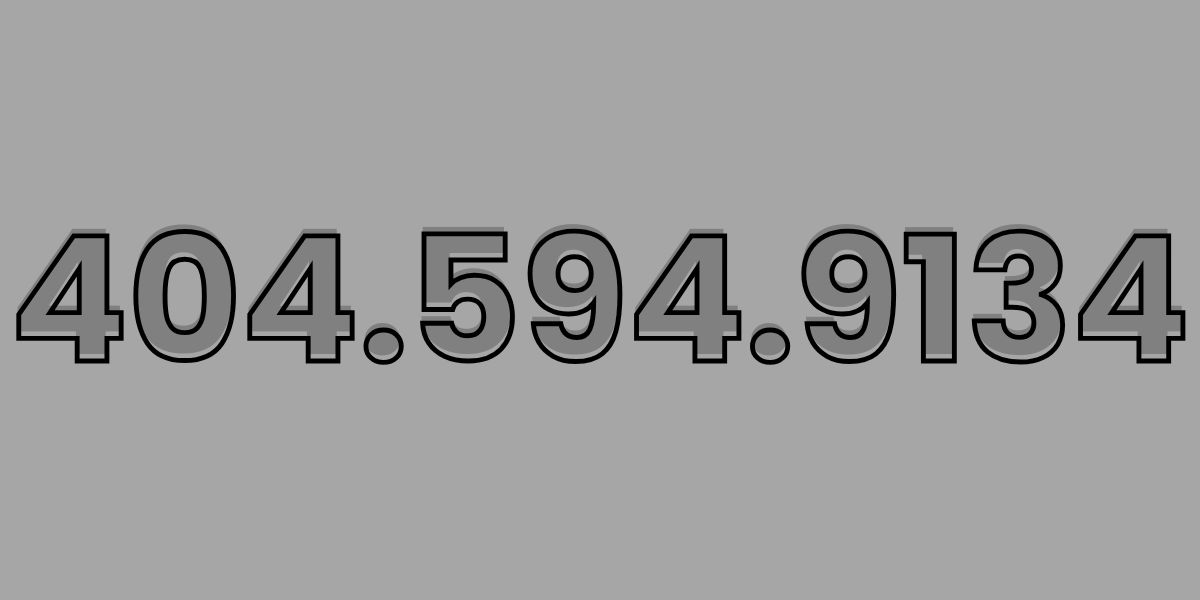In a world where every call can be significant whether from a family member, a business, or a scammer the phone number 404.594.9134 raises more questions than it answers. As digital communication evolves, certain phone numbers gain attention due to frequent appearances in missed calls, promotional messages, or online discussions. While it may seem like just another combination of digits, 404.594.9134 has become a subject of curiosity and concern for many. For some, it’s a source of mystery calls; for others, it’s tied to unsolicited telemarketing. This number, bearing the 404 area code associated with Atlanta, Georgia, has found itself in the spotlight for reasons ranging from technical analysis to consumer protection alerts. Understanding the significance of numbers like this one requires a deep dive into how phone numbers work, how they’re managed, and what their uses reveal about modern communication. This article explores 404.594.9134 in a broader context, connecting it to the way we engage with technology and the potential risks that come with it.
The History and Evolution of 404.594.9134
To understand 404.594.9134, we need to start with the area code 404 which has deep historical roots in American telecommunications. Assigned in 1947 as one of the original area codes in the North American Numbering Plan (NANP), 404 was initially used across the entire state of Georgia. However, as the population and demand for telephone services grew, the area had to be split and overlaid with new codes like 770, 678, and 470. Today, 404 remains synonymous with Atlanta and its immediate suburbs, a bustling hub for technology, media, and commerce.
The specific number 594.9134 appears to follow typical numbering patterns and doesn’t stand out as belonging to a particular corporation or public institution. However, its association with the 404 area code can be enough to generate attention. In recent years, people have reported receiving calls from this number without prior context leading to assumptions ranging from marketing schemes to spam activity. As more consumers document strange or unsolicited calls online, numbers like 404.594.9134 become part of a broader narrative of digital disruption and technological anonymity.
How Phone Numbers are Assigned and Managed
Phone numbers in the United States are regulated under the North American Numbering Plan, which is overseen by the Federal Communications Commission (FCC) and administered by the North American Numbering Plan Administrator (NANPA). Each number, including 404.594.9134, is part of a systematically structured 10-digit format: a 3-digit area code, a 3-digit prefix, and a 4-digit line number. These components are not randomly created but are assigned to telecommunications carriers based on demand, location, and infrastructure.
When a phone number is assigned to a provider, it is then allocated to consumers or businesses through subscription. However, due to number portability laws, users can retain their number across different service providers, adding complexity to tracking or identifying origin. This also opens the door for reused or recycled numbers, meaning that a once-legitimate number could be repurposed by another user sometimes even for malicious purposes. That makes identifying a number like 404.594.9134 challenging without carrier-level insight or verification tools.
ALSO READ: IFVOD
The Importance of Phone Numbers in Today’s Society
Phone numbers serve as more than just tools for communication. They function as digital identifiers often more widely used than email addresses in certain parts of the world. From two-factor authentication and banking to healthcare access and e-commerce, your phone number is essentially your verification passkey in today’s interconnected systems.
Given how embedded numbers are in identity verification, the presence of unknown or suspicious numbers like 404.594.9134 raises concerns. While a simple call might be harmless, the psychological effect of consistent unknown callers or missed calls can be stressful. Phone numbers also serve as gatekeepers to both personal and professional networks, making them vital for trust-building and contact reliability. In this digital-first era, ignoring calls from unfamiliar numbers can lead to missed opportunities but answering them might expose one to scams or data breaches. It’s a balancing act that defines modern communication.
How Phone Numbers are Used in Marketing and Business
Marketing in the digital age has evolved to incorporate direct-to-consumer strategies, and phone calls still play a crucial role. Businesses use numbers like 404.594.9134 to conduct surveys, make promotional offers, or follow up on leads. Sometimes, call centers purchase blocks of numbers that may rotate frequently, including those with specific area codes to appear more local and trustworthy to recipients.
This tactic, known as “neighborhood spoofing,” involves displaying a number with the same area code and prefix as the recipient’s own to increase the likelihood that the call will be answered. Whether or not 404.594.9134 is part of such a strategy is difficult to determine without clear business attribution. However, its repeated reporting on forums and call-tracking sites suggests it may be used by telemarketers or lead-generation companies. While not inherently malicious, such uses blur the line between legitimate marketing and harassment, especially when users are unable to opt out or identify the caller’s intent.
Security and Privacy Concerns with Phone Numbers
Phone numbers are increasingly targeted for cyber fraud and identity theft. With just a number, bad actors can access voicemail, intercept text messages, or even hijack social media and financial accounts through SIM-swapping. Numbers like 404.594.9134 are often reported as spam, not because of what they are, but because of how they’re used often in high-frequency, low-information interactions.
Scammers may spoof legitimate-looking numbers to trick individuals into answering, and if the call is picked up, the goal might be to elicit sensitive information, redirect the user to a fake service, or simply verify that the number is active for future targeting. Additionally, some automated bots use number scanning to test whether certain combinations are operational creating a digital footprint that contributes to unwanted calls. The rise in reported activity around 404.594.9134 may reflect these broader trends in digital intrusion and misuse of phone data.
Emerging Technologies: The Future of Phone Numbers
As we shift toward digital-first communication, the traditional phone number may begin to lose relevance. Services like VoIP (Voice over Internet Protocol), messaging apps, and AI-based chat platforms are replacing voice calls for a large segment of the population. However, for now, phone numbers remain a critical part of infrastructure, especially in financial services, government interaction, and healthcare.
Technologies such as blockchain ID verification, decentralized messaging apps, and biometric authentication are showing promise in reducing reliance on phone numbers for identity verification. Still, numbers like 404.594.9134 remain in active circulation and play a role in day-to-day communication, whether legitimate or exploitative. Future regulation may focus on greater transparency in number ownership, opt-out registries, and AI-powered spam filtering giving users more control over their communication gateways.
Conclusion
Phone number 404.594.9134 might appear as an ordinary string of digits, but its presence in user complaints, spam databases, and unsolicited call reports points to deeper issues in how we manage and perceive communication in the digital age. The evolution of this number from a basic contact identifier in the 404 Atlanta region to a recurring point of concern online highlights the transformation of phone numbers into multi-functional tools and sometimes, sources of anxiety. Numbers like these remind us of the fine line between convenience and intrusion, trust and skepticism, and innovation and abuse. As technology continues to evolve, the responsibility lies with both regulators and users to remain vigilant, informed, and proactive. Understanding the story behind a single number opens a window into the broader challenges and complexities of modern communication. By unmasking 404.594.9134, we gain a clearer picture of our relationship with the technology that connects us all and how to protect that connection in an increasingly uncertain digital world.
FAQs:
What is the 404 area code?
he 404 area code is one of the original area codes in the United States, primarily serving the Atlanta, Georgia metropolitan area.
Is 404.594.9134 a scam number?
While it has been reported by users on various spam-call tracking sites, there’s no official confirmation. Always proceed with caution when receiving calls from unfamiliar numbers.
Can I block calls from 404.594.9134?
Yes, most smartphones allow you to block specific numbers, including 404.594.9134, through built-in call-blocking features or third-party apps.
How can I verify who is calling me?
You can use reverse phone lookup services or caller ID apps to try to identify the source of a call. However, results are not always guaranteed due to spoofing and privacy regulations.
Why do companies use unknown or rotating numbers for calls?
Businesses often use call center software that rotates numbers to avoid spam filters or to appear local to the recipient, which can increase answer rates.
Visit For More Details: Latestmagazine.org







